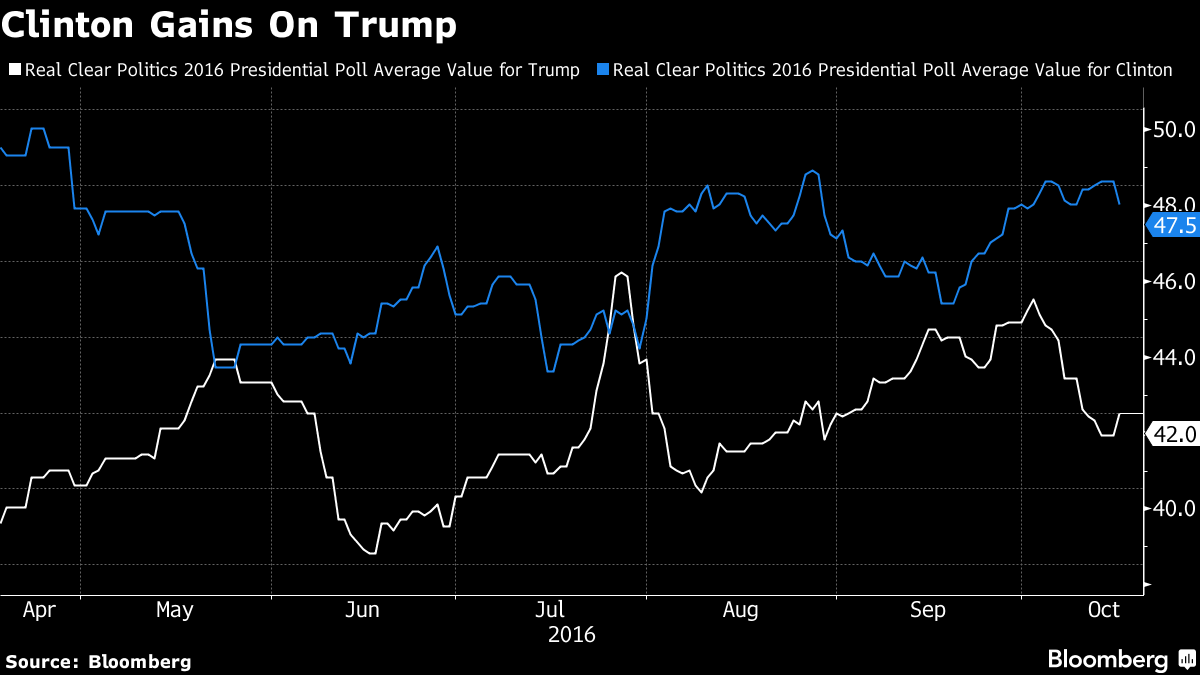With Clinton strengthening her lead on Trump, Wall Street strategists are wondering if a Democratic sweep is a possibility in D.C. next month. Markets have performed very well under the gridlock of the last several years, so theoretically a sweep by one party or another could disturb that status quo.
A note out from Morgan Stanley this morning sheds more light on what Wall Street is now expecting come November. Throughout the election cycle, they had by and large predicted that Clinton would win the presidency, but fail to gain control of both chambers of Congress. They also expected that if Trump were to pull off an upset, he could see a Republican sweep, leading to the prospect of less gridlock in D.C. In recent weeks, however, Clinton's gains have led some to ask if a win by her would also be able to see a Democratic sweep. The team at Morgan Stanley, led by Michael Zezas, says not so fast.
"To date, the biggest risk to our 'policy incrementalism' view had been a Republican sweep of the White House and both houses of Congress," they write. "With Trump's chances fading, and Clinton's lead growing, the 'Democratic Sweep' now carries greater, albeit still small, odds, raising the prospects for increased infrastructure spending and for heavier regulation of the financial and pharma sectors," they said, adding that while they don't expect to see a big comeback in Trump's polling numbers between now and November 8, they also don't expect them to fall much further.

Analysts at Goldman Sachs Group Inc. say conversations with clients are now starting to focus on the odds of a Democratic sweep of D.C., or what they call a 'wave election,' or when one party makes large gains in the number of seats they hold in Congress. This leads to better odds of controversial proposals getting passed, as there would be less gridlock and it would be easier for the party to get the votes it needs for the legislation to pass.
The team, led by Chief U.S. Equity Strategist David Kostin write in their U.S. Weekly Kickstart, adds that the most recent example of a meaningful impact from this would be the Democratic sweep in 2008, which led to the passage of the Affordable Care Act.
Asset classes that could see the largest impacts from a Democratic sweep include pharmaceuticals, financials, and broader risk assets. Pharma and financials would both face negative headwinds from the potential of more regulations given comments from Clinton and other Democrats, while risk assets could benefit from more infrastructure spending which both candidates have talked about increasing.
But before investors go selling stocks in one of those two sectors, note that Morgan Stanley doesn't advise doing that, even if Clinton's lead strengthens further.
"If we're wrong, and there is a Democratic sweep, there are still challenges to executing a progressive policy agenda," they write. "Republicans will likely maintain filibuster power in the Senate, and several key Senate Democrats are up for reelection in Republican and swing states in 2018, which may temper their enthusiasm for more progressive policies."
This article was provided by Bloomberg News.








